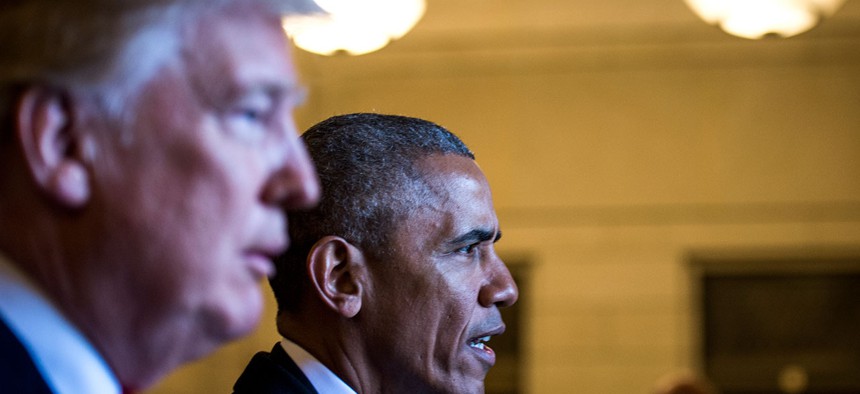
Staff Sgt. Marianique Santos/Air Force
Trump's Policy on Terrorism Suspects Looks Like Obama's
A captured Benghazi suspect is reportedly being brought to the U.S., which means he will be tried in a civilian court.
Reports that U.S. special-operations forces captured a key figure in the fatal attack on the U.S. consulate in Benghazi in 2012 will likely restart the debate over whether terrorism suspects should be tried in civilian courts. The attack resulted in the deaths of four Americans, including Ambassador Christopher Stevens, dented U.S. prestige in Libya and the broader Arab world, and became a rallying cry for critics of Hillary Clinton, the unsuccessful Democratic presidential nominee who was U.S. secretary of state at the time of the attack.
The captured suspect, whom U.S. Secretary of State Rex Tillerson identified in a statement as Mustafa al-Imam, is reportedly being transported to the United States where he will face criminal charges. He is the second person linked to the attack to be brought to the U.S. after Ahmed Abu Khattala, the militia commander who has been described as a mastermind of the Benghazi attack. Khattala, who was captured in 2014 and brought to the United States, was charged with 18 counts. He is being tried by a federal court in Washington, D.C, and says he is innocent.
The transfer of a terrorism suspect to the U.S. is significant because it continues the Obama-era Justice Department’s practice of using civilian courts to try terrorism suspects. Soon after his election in 2008, President Obama pledged to shut down the U.S. detention center in Guantanamo Bay, Cuba, and transfer most suspects to the U.S. mainland for trial. Reports that more than 200 terrorism suspects would be transferred to either a Supermax facility in Colorado or the military prison at Fort Leavenworth in Kansas prompted rare bipartisan unity to oppose such a move. Obama also had to reverse his plan to try Khalid Shaikh Mohammed in New York; the alleged 9/11 mastermind remains in Guantanamo.
Over the years, though, several terrorism suspects have indeed been convicted by civilian courts. These include Zacarias Moussaoui, the so-called 20th hijacker on September 11, 2001; Richard Reid, the shoe bomber, and Jose Padilla, the al-Qaeda members. All of these trials occurred during the Bush years (2000-2008) when the administration was also filling the facility at Guantanamo.
At its peak, Guantanamo held more than 750 prisoners, but Obama released those that were deemed to be of little to no risk and persuade other countries to take them. Some 55 detainees, the so-called “worst of the worst” suspects are still at the facility. Even as Obama tried to reduce that number, Donald Trump, when he was presidential candidate, derided the idea of civilian trials for terrorism suspects. He vowed to fill the facility at Guantanamo Bay with “bad dudes.” His attorney general, Jeff Sessions, has long said the U.S. has been at war since September 11, and “our normal criminal justice procedures were not designed for and were not appropriate for the new threat.” Indeed, at least one American citizen, an ISIS member captured in Syria, is reportedly in military custody and being held as an enemy combatant. The Trump administration has reportedly not decided what to do with this suspect.
Still, the Trump administration’s practice with newly captured terrorism suspects hews closely to its predecessor’s policy.
In July, Ali Charaf Damache, a dual Irish-Algerian citizen who is suspected of being an al-Qaeda recruiter, was transferred to the U.S. from Spain, and later appeared in federal court in Philadelphia. Damache was accused of being part of a plot to kill a Swedish cartoonist who depicted Islam’s Prophet Muhammad in a cartoon. He became the first foreign citizen to be brought to the U.S. for trial in the Trump era. But his transfer to the U.S. could have also been linked to the opposition of a European country, Spain, to transfer a European citizen to Guantanamo, a facility many European view with disdain. Still, civil-rights groups praised the Trump administration for its decision to give Damache a civilian trial.
President Trump reportedly also approved the reported capture of al-Imam, the Benghazi suspect. The charges against al-Imam will be revealed once he is physically in the U.S.






